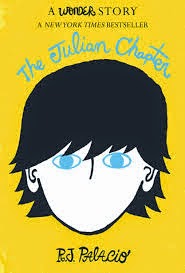Wonder by R.J. Palacio is about a boy named August who is as ordinary as any other boy. He loves Star Wars, playing video games, and spending time with his family. But there is one thing that makes August different. He was born with a genetic facial disorder that makes him look very different from other people and prevented him from attending mainstream school due to him needing many medical treatments. That is, until fifth-grade when August is able to start attending middle school. This is an adjustment for both August and his classmates. But along the way, August is able to meet people who opt to "choose kindness" and make his first year of school a success.
Although
Wonder has plenty of moments that could break your heart, one of the hardest parts of the book for me to read was when the Pullman's dog Daisy passes away. I didn't expect to cry while reading, but all of a sudden, in the middle of Starbucks, the waterworks were just coming. I connected to this part of the story strongly because my family and I had to put my dog Shadow down in November. He was experiencing health problems just like Daisy so I could easily relate to how August's parents were feeling about having to make the choice to end their dog's suffering. It was one of the hardest things my family had to do and we are all still trying to cope with the loss.
My reaction to this part of the book made me think about something. When I read about the death of a human, I feel sad and upset but I almost never cry (Unless it is extremely sad like
The Fault in Our Stars or
My Sisters Keeper. Then pass the tissues, please!). However, when the death of an animal is involved, I can't seem to control my tears. This makes me wonder, why am I more likely to cry over the death of an animal than that of a human? I feel like many of my friends and family experience this as well. I'm not sure if we have just become conditioned to hearing or reading about the death of other humans or if it is something else that triggers such a response.
Another thing I thought about after reading was that even though I empathized with August, I could not help myself from putting myself in the other character's shoes. When I think about Jack, Summer, and Charollette, I admire their courage to befriend August and the kindness that they treat August, and others, with. Although I would like to say that I would have made the same choices as them if I was in a similar situation in middle school, I am not so sure that I would. This is not because I am mean-spirited or extremely shallow. I am just not sure if I would have felt confident enough to drift away from the crowd. I wish that I had been able to read
Wonder when I was in middle school because I think it would have helped me to consider those who were bullied or treated differently and to try to find a way to "choose kindness" just like Jack, Summer, Charollette, and eventually the rest of August's fifth grade class did. And although I
can not go back in time and choose kindness,
Wonder was a nice reminder that when in doubt, always choose to be kind.





